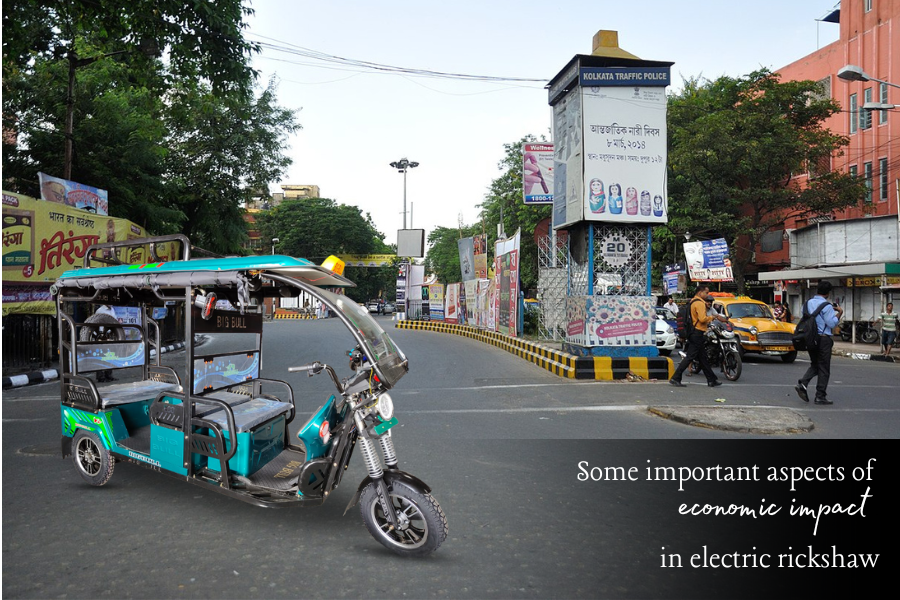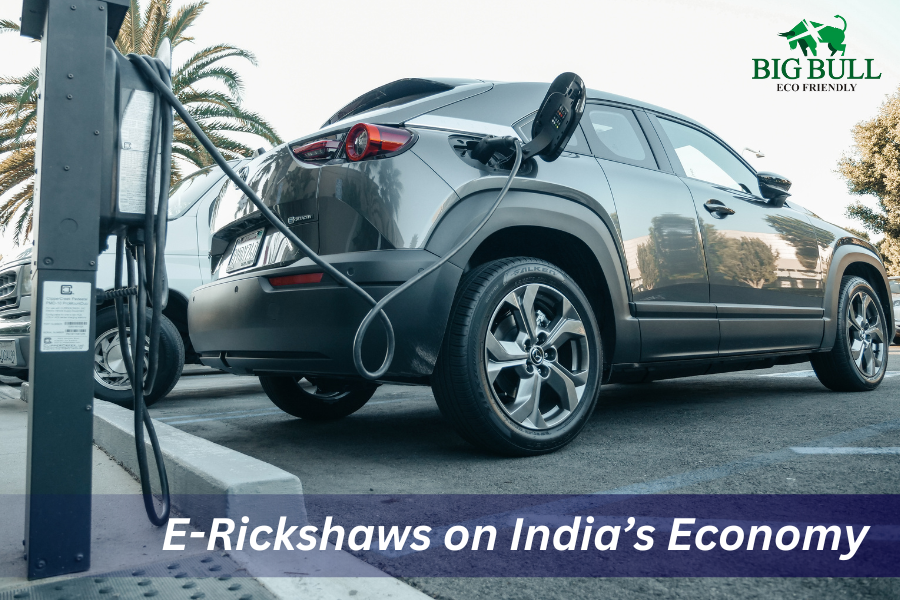In India, the need for environmentally friendly transportation solutions is growing, and e- rickshaw economic impact, or E-rickshaws and electric scooters, have become a well-liked and sustainable substitute for the conventional gas-powered rickshaws. However, e-rickshaws aren’t simply advantageous for the environment; millions of individuals all throughout the nation are getting new work options thanks to them.
With insights from big bull, a top producer of E-rickshaws and replacement components, we’ll examine how e-rickshaw economic impact are boosting employment and the Indian economy in this blog article. The rising demand for e-rickshaws is one of the primary factors driving employment growth in this sector. The demand for E-rickshaws is rising as more and more people become aware of their advantages. To meet the demand, more E-rickshaw drivers, mechanics, and other support personnel are now required.
Table of Contents
ToggleSome important aspects of electric rickshaw economic impact:

lots and lots of e-rickshaws wait in line at Metro stations and traffic lights in Noida and many other metropolitan cities during rush hour, saving the lives of city commuters. In addition to giving Metro passengers the crucial last-mile connectivity they need, they also generate a lot of jobs in the unorganised sector.
In addition to being inexpensive, e-rickshaws have grown to be a significant form of self-employment. According to Vahan data, the number of passengers registered increased to 4,74,224 in 2023 from 82,849 in 2020—a definite five-fold increase in e-rickshaw economic impact.
The commercial use of electric vehicles (EVs) and e-rickshaws, according to analysts, can be tapped into by automakers that are considering reducing their production of fossil fuel-powered vehicles. Furthermore, by 2030, this could be a major factor in elevating India to the top of the world EV market. According to recent research by Bain and Company, by 2030, electric vehicles (EVs) may represent more than 40% of the Indian automobile market and bring in more than $100 billion in revenue. As a result, policymakers must look into ways to increase the penetration of e-rickshaw economic impact.
FAME, or Faster Adoption and Manufacturing of (Hybrid &) Electric Vehicles, is currently developing its third phase. However, according to rumours, the FAME Phase III will prioritize the development of alternative fuel vehicles and the expansion of the infrastructure for charging them. To maintain the momentum behind EVs, the makers will look to raise the expenditure. In order to improve charging infrastructure and offer incentives for electric and hybrid vehicles, the government introduced Fame I in April 2015 and Fame II in April 2019. This enabled e-rickshaw economic impact become more competitive with their internal combustion engine (ICE) equivalents.
It would therefore be advantageous for the government and the manufacturers to follow the trend and place their bets on the EV market for commercial use. By doing this, fossil fuel-powered cars would be removed from Indian roadways and jobs in the unorganised sector will be created. Government emphasis on commercial e-rickshaw economic impact can help India become more sustainable in terms of employment and the environment. Drivers who ppare frustrated should bite their tongues and keep cool since electric vehicles (EVs) are here to stay and might eventually replace diesel trucks.
E-Rickshaws on India’s Economy:

With the rise of e-rickshaw economic impact India’s transportation environment has changed significantly in recent years. In addition to offering a practical means of getting around crowded city streets, these economical, environmentally friendly forms of transportation have had a big impact on India’s economy. We’ll talk about the different ways that e-rickshaws have impacted India’s economy in this blog post, as well as how they continue to influence the transportation sector.
1. Electric rickshaw Employment:
E-rickshaws have helped India create jobs by giving drivers, mechanics, and other support workers places to work. Over a million jobs have reportedly been created by the e-rickshaw sector in India, opening up employment options for individuals from all walks of life.
2.cost effectiveness of electric rickshaw:
E-rickshaws are reasonably priced forms of transportation that offer drivers and passengers an economical option. E-rickshaws are less expensive to operate than regular rickshaws since they run on electricity rather than gasoline or fuel. They are therefore the best choice for anyone seeking a convenient and reasonably priced form of transportation.
3. Environmental benefits of electric rickshaw:
Since e-rickshaws run entirely on electricity and emit no pollutants, they are considered environmentally acceptable forms of transportation. This indicates that they are an environmentally friendly mode of transportation that lowers noise and air pollution. This is especially crucial in India, where traffic jams and air pollution are growing problems.
4. Increased of mobility:
In India, e-rickshaws have made people more mobile, especially in cities where traffic congestion is a big problem. E-rickshaws are the ideal mode of transportation for navigating through congested metropolitan streets because they are simple to manoeuvre in traffic.
5. Boost the E- rickshaw economic impact:
Local economies in India have benefited from the expansion of the e-rickshaw sector, especially those in manufacturing and replacement parts. The popularity of e-rickshaws has increased demand for replacement parts, which has resulted in the expansion of regional manufacturing sectors.
At bigbull, we’re proud of our dedication to offering e-rickshaws and spare parts that are dependable and of the highest calibre. Our e-rickshaw economic impact, environmentally responsible, and to offer a smooth and pleasant ride. All of our products are designed with quality and safety as our top priorities, and our team of professionals is always here to help and support you.
Conclusion:
Generally speaking, the environment, society, and e-rickshaw economic impact might all benefit from the transition to electric rickshaws. All parties’ interests must be balanced during the transition, and any challenges must be taken into consideration. By doing this, countries may build sustainable transportation systems that improve people’s quality of life and stimulate economic development. To sum up, e-rickshaws have significantly impacted India’s economy by fostering local economic growth, cost savings, job creation, and environmental advantages. For an effective and environmentally friendly mode of transportation, go for big bulls e-rickshaws and spare part.






